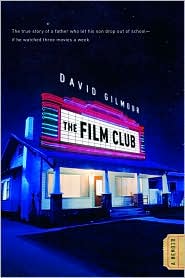Toronto, Ontario
Canada
INTERIOR – A FRENCH RESTAURANT – NIGHT
Father and 15-year-old son seated at a table, facing each other.
DAVID
Have you been thinking about what we talked about?
JESSE
(almost whispering)
The truth is, I don’t ever want to see the inside of a school again.
ANGLE ON FATHER’S FACE
DAVID
(nervously)
Okay, then. One thing, though . . .
Convinced that high school was “killing” his son and desperate to turn things around for him, David Gilmour proposed a radical alternative. Jesse didn’t have to work or pay rent for the next year, but there were two conditions. He had to watch three films a week with his father—all of them Gilmour’s choice. And he had to steer clear of drugs.
One year flowed into two, and almost three, and what transpired is the subject of the lean and tender memoir The Film Club: A True Story of a Father and Son.
The decision to let Jesse leave school had been a hard-wrought one for Gilmour, a former TV personality and film critic. He and his ex-wife, Jesse’s mother (actress Maggie Huculak), were “very much in the dark” and “deeply, deeply worried.” But what can you do, he says, when you have a kid who’s 6-foot-4 and hates the classroom? “School wasn’t just bad for him; it was distorting his personality and the failure was ruining his adolescence.”
Unemployed at the time, Gilmour was going through a difficult period himself. At 50, he was finding media doors closed to him and a publisher had rejected his latest novel. He was plagued by doubts. Believing he had “mismanaged” his own life, he says, who was he to think that he could give his son guidance?
But Gilmour’s wife, Tina Gladstone, and Jesse’s mother both supported him in the innovative home-schooling experiment. Huculak even moved out of her home in Greektown to allow Gilmour to live there with Jesse. Though the memoir only occasionally mentions the women in his life, he admits that he couldn’t have done what he did without their trust.
The first film he showed Jesse was, quite appropriately, about an alienated teenager: Francois Truffaut’s classic Les quatre cents coups (The 400 Blows). Eventually keeping notes on yellow cards on the refrigerator, and “winging” the choice of movies—“You get better at things as you go along”—Gilmour introduced Jesse to “at least” three films a week. What evolved was a cross between a never-ending guys’ night, towers of pizza boxes accumulating in the living room, and a film-appreciation course, during which they explored everything from the French New Wave to the documentary Volcano: An Inquiry into the Life and Death of Malcolm Lowry to Rocky III.
Gilmour desperately wanted to avoid sounding like a “dandruffy high-school teacher.” He soon learned when to pull back and let the film speak for itself. “The one thing I tried to do was make [the films] entertaining. I didn’t show him any movies that bored me but that I thought he should watch.” Gradually he came to understand that it wasn’t so much the movies themselves as the process of watching and discussing them together that was important.
Away from the film club, Jesse was navigating, with varying degrees of success, the bumpy terrain of adolescence, including insecurity, lack of direction, sex and heartbreak, and the lure of drugs. But at home, thanks to regular sit-downs in front of the TV screen, the two were doing what fathers and teenage sons often don’t do enough. They were opening up to each other.
“Have you ever cried in front of a girl?” Jesse asks one evening.
“The question is, is there a girl I haven’t cried in front of,” Gilmour replies.
Nevertheless, he sometimes questioned his decision to let Jesse leave school, wondering if he was “setting a disastrous precedent for how to manage your life” and sending the signal that if something is hard, just quit. He even doubted his own motives: Was he pursuing this alternative just to make himself look hip?
One day, shortly after he’d spent money he didn’t have to take his ex-wife and son to Cuba for a holiday, a documentary deal fell through.
“I stomped up and down the living room,” he writes, “with my fists clenched and swearing revenge; Jesse listened quietly, numb with guilt, I imagine. I went to bed drunk; woke up at four in the morning to pee; just as I flushed the toilet, my watch slipped from my wrist and whirled down the chute. I sat down on the toilet and had a small, private weep. Here I’d let Jesse drop out of school, I’d promised to look after him and now it turned out I couldn’t even look after myself. . . .”
But the film club marched on, Gilmour sharing with Jesse his take on films and actors and directors, and in the process, life.
In retrospect, Gilmour knows that that period with Jesse was a gift. The film club wasn’t about the movies, he says, but about paying attention to his son when he really needed it, “when most teens are closing the door and easing you out of their life.”
By the time Jesse was approaching his nineteenth birthday, he had stumbled through several part-time jobs, joined a rap band, earned a few of young-love’s scars, and returned to studies via a three-month “crash course” and tutoring from his mother, a former high-school teacher. And the film club of almost three years was fading to black.
As Gilmour writes, “He outgrew the film club and, in a certain way, he outgrew me, outgrew being a child to his father. You could feel it coming on for years, in stages, but then suddenly, there it was. It can loosen your teeth if you let it.”
Not long after that, Gilmour’s career took an upturn. His novel A Perfect Night to Go to China, rewritten since its earlier rejection, was accepted by Thomas Allen Publishers, and went on to win the 2005 Governor General’s Literary Award. For his next project, he had planned to write a nonfiction book about how to get over a woman, but Jesse suggested that he write instead about their film club years.
Gilmour, author by then of six novels, made notes with the thought of weaving the experience into fiction. As a novelist, however, he felt he was “running out of gas.” He found the shift to memoir energizing. It was freeing, he says, not to have to make up characters.
In an early draft, written in just three months, the first fifty pages were mostly about the author—“a long and self-involved account of my woes,” as he candidly admits. He credits the instincts of his Canadian and American editors with improving the book. Both realized immediately that the story was that of a father-and-son relationship, not, as he says Thomas Allen publisher and editor Patrick Crean put it, “a guitar solo.”
The editors also knew that readers would want more of the author’s ruminations about film. Interestingly, the aspect Gilmour found more difficult than describing with Jesse’s teenage struggles was conveying their film club conversations “without bringing the story to a grinding halt.” He also had to find the right “voice.” In choosing to write about film scenes in the present tense, he was influenced by Philip Roth’s The Professor of Desire, about a professor teaching the works of Chekhov.
Looking back, Gilmour says he never felt constrained in writing about Jesse. “Artistically I’ve learned that you can’t proceed like that. . . . You have to write it in the ideal way, and you can’t start thinking, ‘Gee, he’s not going to like this,’ or ‘He’s not going to like that,’ or ‘This is going to make me look bad’ . . . . You’ll be so hog-tied and self-conscious that you won’t be able to write a word.” Instead, he aimed to “write it first and sweat about it later.”
The deal with Jesse was that he would not read the book until it was in galleys, just prior to publication, and if there was anything he couldn’t live with, Gilmour would cut it.
That plan almost backfired. “There were sections he wanted out . . . and it was pretty dismaying,” says Gilmour. His mother too was “pretty wound up” the first time she read it, concerned that making some of their son’s experiences public would hurt his reputation. Says Gilmour: “I told Jesse, ‘Please, take the weekend and think about it.’”
Did he ever have moments of doubt about the book as he’d written it? “No . . . to me it was a portrait of a young man who was adored.”
That young man thought things through and bravely agreed to let The Film Club go to press unaltered.
The resulting memoir has since garnered excellent reviews, including a full-pager in The New York Times. It hit a couple of Canadian bestseller lists in fall 2007, and is now selling “very well” in the United States, according to David’s agent, Sam Hiyate. Gilmour says he has had more reader response to this book than to any of his novels. At book signings, many want to share with him related experiences from their own lives. The story crosses cultural boundaries, too, as evidenced by its translation into eleven languages. And Hiyate believes there is “huge potential for film,” though the right offer hasn’t come in yet.
Discussion of movie rights brings the story full circle, and one can’t resist asking the film critic this: If The Film Club makes it to the big screen, who would he like to direct it? He laughs, but without missing a beat replies that his first choices would be Julie Taymor (Across the Universe; Frida) or Sofia Coppola (Marie Antoinette; Lost in Translation).
Not surprisingly, Jesse, now 22, has an incredible knowledge of film. Having completed a year at the University of Toronto, he’s even been accepted at a film school in Prague. But at time of writing, he’s a chef in Vancouver and still isn’t sure that formal education is for him.
Gilmour, currently a visiting professor of literary studies at the University of Toronto, says that if he learned anything from the film club, it’s that people have to find their own way. “Jesse was always going to be the person he is today. He was becoming that person all along. . . . I just couldn’t see it, so I thought he was lost.”
“Sometimes,” he adds, perhaps thinking of himself, “lost is finding your way too.”
For more about David Gilmour, visit his website here.
Copyright 2008 Allyson Latta.

